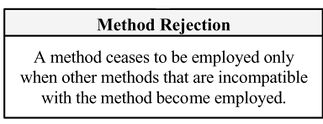Difference between revisions of "Static vs. Dynamic Methods"
| Line 6: | Line 6: | ||
|Authors List=Hakob Barseghyan, | |Authors List=Hakob Barseghyan, | ||
|Formulated Year=2015 | |Formulated Year=2015 | ||
| + | |Prehistory=The question as to whether the requirements theories should satisfy as well as the assessment criteria employed to evaluate theories are transhistorical (i.e. remain fixed over time) or, on the contrary, change on a par with theories has been addressed by several renowned philosophers of science. Some of them subscribed to the static methods thesis, namely that scientific methods are immune to change (Barseghyan: 2015). | ||
}} | }} | ||
{{Acceptance Record | {{Acceptance Record | ||
Revision as of 23:18, 26 February 2017
Are there any methods which are immune to change?
The question of whether or not methods are static or dynamic is a fundamental question in the scientonomic community. A method is said to be static when it is immune to change, and dynamic when it is not.
In the scientonomic context, this question was first formulated by Hakob Barseghyan in 2015. The question is currently accepted as a legitimate topic for discussion by Scientonomy community.
In Scientonomy, the accepted answer to the question is:
- A method ceases to be employed only when other methods that are incompatible with the method become employed.
Contents
Broader History
The question as to whether the requirements theories should satisfy as well as the assessment criteria employed to evaluate theories are transhistorical (i.e. remain fixed over time) or, on the contrary, change on a par with theories has been addressed by several renowned philosophers of science. Some of them subscribed to the static methods thesis, namely that scientific methods are immune to change (Barseghyan: 2015).
Scientonomic History
Acceptance Record
| Community | Accepted From | Acceptance Indicators | Still Accepted | Accepted Until | Rejection Indicators |
|---|---|---|---|---|---|
| Scientonomy | 1 January 2016 | That is when the community accepted its first answers to this question, the Static Procedural Methods theorem (Barseghyan-2015) and Dynamic Substantive Methods theorem (Barseghyan-2015), which indicates that the question is itself considered legitimate. | Yes |
All Theories
| Theory | Formulation | Formulated In |
|---|---|---|
| Dynamic Substantive Methods theorem (Barseghyan-2015) | All substantive methods are necessarily dynamic. | 2015 |
| Static Procedural Methods theorem (Barseghyan-2015) | All procedural methods are necessarily static. | 2015 |
If an answer to this question is missing, please click here to add it.
Accepted Theories
| Community | Theory | Accepted From | Accepted Until |
|---|---|---|---|
| Scientonomy | Static Procedural Methods theorem (Barseghyan-2015) | 1 January 2016 | |
| Scientonomy | Dynamic Substantive Methods theorem (Barseghyan-2015) | 1 January 2016 |
Suggested Modifications
Current View
In Scientonomy, the accepted answer to the question is Method Rejection theorem (Barseghyan-2015).
Mechanism of Method Rejection
Method Rejection theorem (Barseghyan-2015) states: "A method ceases to be employed only when other methods that are incompatible with the method become employed."
According to the method rejection theorem, a method ceases to be employed only when other methods that are incompatible with it become employed.
Related Topics
This question is a subquestion of Mechanism of Method Rejection.
References
- ^ Motterlini, Matteo. (Ed.). (1999) For and Against Method. University of Chicago Press.
- ^ Kuhn, Thomas. (1962) The Structure of Scientific Revolutions. University of Chicago Press.
- ^ Feyerabend, Paul. (1975) Against Method. New Left Books.
- a b c Worrall, John. (1988) Review: The Value of a Fixed Methodology. The British Journal for the Philosophy of Science 39, 263-275.
- ^ Laudan, Larry. (1989) If It Ain't Broke, Don't Fix It. The British Journal for the Philosophy of Science 40, 369-375.
- ^ Worrall, John. (1989) Fix It and Be Damned: A Reply to Laudan. The British Journal for the Philosophy of Science 40, 376-388.
- ^ Laudan, Larry. (1984) Science and Values. University of California Press.
- ^ Barseghyan, Hakob. (2015) The Laws of Scientific Change. Springer.
